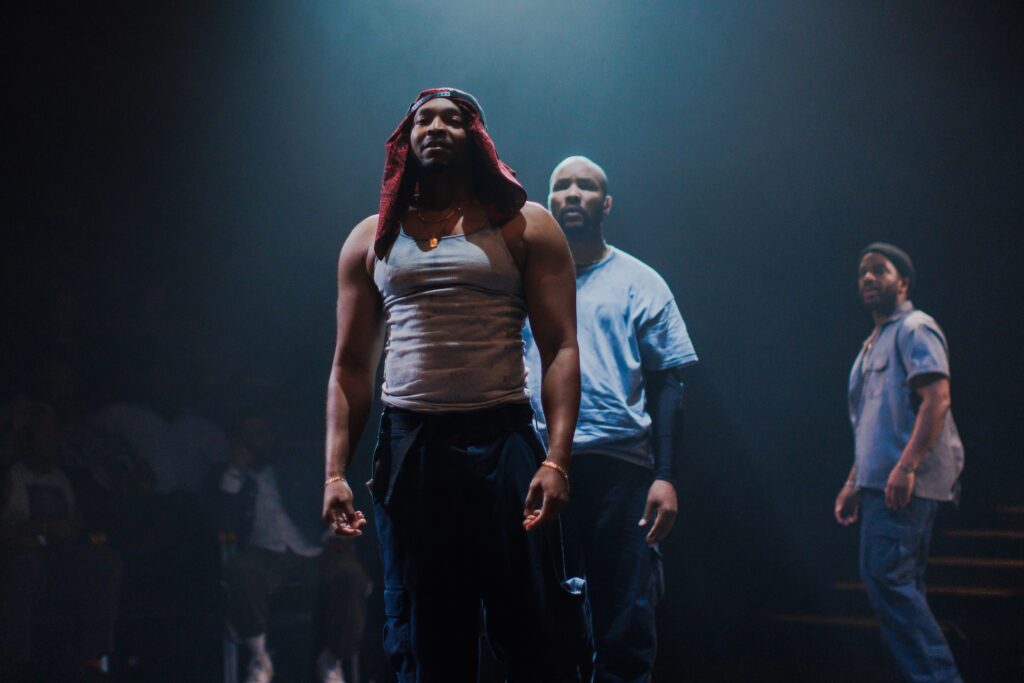The Tortured but Unbreakable Bond Between the Siblings in ‘The Brothers Size’ Speaks to the Challenges of Kinship and Love
Exuberant, witty dance moves contribute to the musicality of Tarell Alvin McCraney’s language — some lines are even sung — and help provide welcome comic relief.

Great art can combine specificity with universality. “The Brothers Size,” first performed when its author, Tarell Alvin McCraney, was in graduate school some 20 years ago, is a case in point: Inspired by the Yoruba folklore of West Africa, the one-act piece — part of “The Brother/Sister Plays,” a trilogy — is set in Louisiana, near the Bayou, in what the playwright identifies as “the distant present.”
The titular siblings are Ogun Size, a black auto mechanic, and his younger brother, Oshoosi, an ex-convict who is living with Ogun while on parole. They are particular personality types — Ogun is disciplined and driven, Oshoosi more laid-back and irreverent — and they face particular obstacles, notable among them a system of incarceration that tends to favor neither their skin color nor Oshoosi’s lackadaisical attitude and pursuit of leisure.
Yet in exploring the tortured but unbreakable bond between Ogun and Oshoosi, “Size” speaks with power and poignance to challenges inevitably posed, in some manner, by kin, and by love of all kinds. And in a new production co-directed by Bijan Sheibani and Mr. McCraney, these issues are addressed with a grace and grit that do full justice to the text.
Suzu Sakai’s bare set evokes, literally, the title of Bertolt Brecht’s “Caucasian Chalk Circle,” another parable-like play concerned with family ties and social justice. The space is relatively small, emphasizing the sense of confinement in which the characters operate; choreographer Juel D. Lane nonetheless provides exuberant, witty dance moves that contribute to the musicality of the language — some lines are even sung — and help provide welcome comic relief.

Ogun is played by André Holland, an admired stage and screen veteran whose film credits include “Moonlight,” based on a script by Mr. McCraney, who won an Oscar for the project. In a program note, the playwright points out that his working relationships with both Mr. Holland and Alani iLongwe, the actor cast as Oshoosi, stretch back at least two decades, and the rapport between the performers and their affinity for the material is palpable throughout.
Malcolm Mays, a star of the TV series “Power Book III: Raising Kanan,” appears as a third character, Elegba, Oshoosi’s former prison mate and enduring friend, as well as the devil poised over his shoulder. Mr. Mays brings a deft physical lyricism to the part, so that it’s easy to envision Elegba as much as a spirit as a person, materializing whenever his buddy or the plot require him.
Elegba’s presence and his influence, not surprisingly, exacerbate the tension between the brothers. A heated confrontation between Elegba and Ogun in the play’s latter half lays the groundwork for an even more explosive meeting between the siblings, in which Mr. Holland delivers a monologue with such blistering authority and sheer pain that it will leave you breathless.
The exchanges that follow segue from effusive, bittersweet humor to shattering sadness, with Messrs. Holland and iLongwe — the latter is equally potent and can be especially funny, when he’s not breaking your heart — evince the mix of responsibility, guilt, and, above all, love that makes Ogun’s relationship to his brother so tender and tragic.
“I burned my chance at anything so that I didn’t leave you behind,” Ogun tells Oshoosi at one point. A good deal of the dialogue can’t be printed here, as the use of profanity in this play would impress David Mamet, in both its plentitude and its artfulness.
Stage directions in “The Brothers Size” are also intended to be read aloud, so that actors can announce their entrances, and sometimes describe their emotions, in character. By the time the final ones are read aloud, establishing that Ogun has been “left alone in the early fore day in the morning mist,” you may feel vicariously haunted, but you’ll almost certainly be grateful for the ride.

